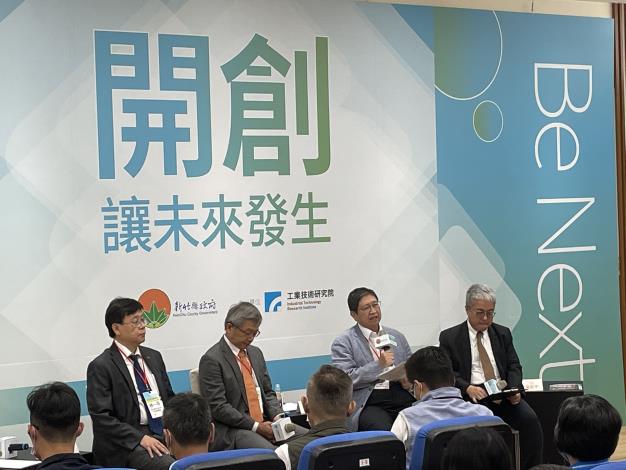
The Hsinchu County government today (8/19) held the “Technology Realization. ESG Innovation” Hsinchu County Urban Transformation Forum, inviting scholars from various sectors to analyze key factors needed to transform Hsinchu County into a smart and green city. Hsinchu County Magistrate Yang Wen-ke said that Hsinchu County is promoting policies such as YouBike 2.0, big data applications, and smart transportation. Hsinchu County is gradually transforming into a smart city.
The theme for the forum is based on Hsinchu County’s urban infrastructure and industrial characteristics. There was a focused discussion on “Creating a Future City,” as well as four main themes: “Smart City Infrastructure Path,” “Education Revolution Talent Path,” “ESG Economic Sustainability Path,” and “IoT Innovative Application Path.” Yang Wen-ke and 23 guests shared their experiences and insights on the ecosystem of the technology industry, smart transportation, smart education, the metaverse, energy strategy, the circular economy, smart pandemic prevention, and innovative entrepreneurship.
The first panel on “Creating a Future City” was with Yang Wen-ke, Business Weekly Group General Manager Chu Chi-chung, National Tsing Hua University Distinguished Chair Professor Wu Cheng-wen, and National Yang Ming Chiao Tung University Tenured Chair Professor Lin Yi-ping. Yang Wen-ke began by introducing various innovative policies in Hsinchu County. Scholars Wu Cheng-wen and Lin Yi-ping respectively put forth opinions, and suggested that the county government should focus on providing a sports atmosphere along with the construction of stadiums, as well as the use of big data hubs.
Yang Wen-ke said that Hsinchu County is gradually advancing its transformation in becoming a smart city. He cited YouBike 2.0 and green transportation as being the best way to save energy and reduce carbon. Additionally, the county is revitalizing Dongxingzhen Shuizhen Park and the Douzaipu River, so the city can plant more trees, have a prettier skyline, and substantially increase green coverage. These are all components of a smart city. The transformation into a smart city must be governed by innovative methods, using technological capabilities, big data, 5G, and the IoT to make cities better, and for the policies to be more efficient.
Yang Wen-ke said that Hsinchu County’s athletic strengths have greatly improved in recent years. This year, Hsinchu received 59 medals in the National High School Games, an increase in 10 medals compared with last year, which is an indication of the county’s advancement in sports. However, young residents have complained recently that there aren’t enough sports facilities. Yang had already asked the Education Bureau to take stock of the sports facilities in Zhubei City by the end of the year, and make up for any shortages. The county government’s support in sports is without hesitation, including offering nutritional subsidies for athletes placing in the top three in national competitions. Yang also hopes outstanding athletes will become physical education teachers in the county. The county’s care for athletes can be elevated to a love of and support for sports by all.
Testing of the information commons platform will be carried out at the Taiwan Knowledge Park. A wireless network will be built, along with establishing information channels required for smart street lights, electricity, water, etc. The facilities required for self-driving cars will also be concentrated at the Taiwan Knowledge Park. These platforms are all being planned and implemented. After the completion of the construction, “We will achieve a real smart city.”
The county government administrative offices pointed out that in recent years, in areas of smart city and technology governance, Hsinchu County has successively completed measures in smart industry, smart transportation, smart education, smart security, smart governance, smart healthcare, smart environmental protection and new innovation support. Smart industries include the establishment of AI smart parks. Smart transportation uses AI signs to relieve traffic, the Hsinchu County High-speed Rail station is testing self-driving shuttle operations and the use of an intelligent traffic safety warning system.
Smart education includes an AI robot “Classmate Kebbi,” a “Mili Cloud” digital teaching service, and the set-up of the Hsinchu County Smart Campus App, “School+.” Smart security includes security bracelets, and AI fire evidence identification. Smart governance includes a platform for smart welfare services, promote the opening of government data, and developing MyData convenience innovation application services.
Smart healthcare includes technological pandemic prevention network, innovative telemedicine, and smart care immediate rescue services. Smart environmental protection includes Hsinchu County’s air quality sensing IoT deployment plan, and sound photography technology for law enforcement. New ventures are supported by the local industry innovation and R&D promotion plan (local SBIR), and the establishment of the LINE@ tourism “Travel GO” account.